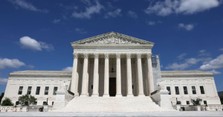
Trending Articles
Recent News
Brandon Lake Takes ‘Good Morning America’ to Church, Says He’s Pointing People ‘to Jesus’ Senate Hearing Goes Viral after Doctor Won’t Say Whether Men Can Get Pregnant Getting the “Theism” Right in New Theism RFK Jr. Gives Food Pyramid an Overhaul When Fear Steals Joy: Dancing, Social Pressure, and the Christian Call David Henrie Says Beauty Can Point People to God in New Series Set in Italy Supreme Court Appears Poised to Uphold State Laws Protecting Women’s Sports Chris Pratt, Patricia Heaton Promote 21-Day Daniel Fast Prayer Challenge Iran Past, Present, and Future The Cure for America’s Spiritual Cancer Technology and Tyranny: AI, Hubris, and Chronological Snobbery Dilbert Creator Scott Adams Accepted Jesus Before Dying, Posthumous Letter Says
Trending Articles
Recent News
Brandon Lake Takes ‘Good Morning America’ to Church, Says He’s Pointing People ‘to Jesus’ Senate Hearing Goes Viral after Doctor Won’t Say Whether Men Can Get Pregnant Getting the “Theism” Right in New Theism RFK Jr. Gives Food Pyramid an Overhaul When Fear Steals Joy: Dancing, Social Pressure, and the Christian Call David Henrie Says Beauty Can Point People to God in New Series Set in Italy Supreme Court Appears Poised to Uphold State Laws Protecting Women’s Sports Chris Pratt, Patricia Heaton Promote 21-Day Daniel Fast Prayer Challenge
Positive Stories
Celebrity
Video
Opinion
Church
Entertainment
Sports
Movies
Politics
Israel
Christian News Headlines - Breaking and Trending Religion News
Crosswalk Headlines - Christian news brought to you by a group of Christian writers and editors who are dedicated to creating a well-rounded look at what’s happening across the globe from a Christian worldview. Our vision is to inform and inspire productive discussion about the current events and online trends that shape our lives, our churches and our world.Crosswalk Headlines includes blog posts about current events and Christian media, breaking news, feature articles, and guest commentaries, many written by respected Christian thinkers.

































































